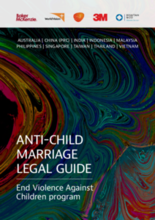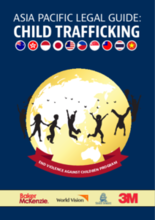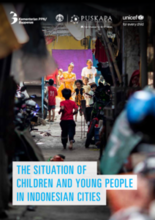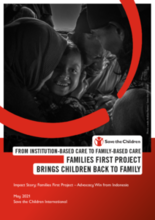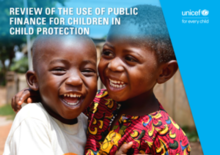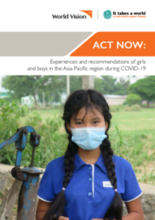demographic_data
childrens_living_arrangement
children_living_without_bio
adoption
social_work_force
key_stakeholders
Key Stakeholders
Add New DataOther Relevant Reforms
Add New Datadrivers_of_institutionalisation
Drivers of Institutionaliziation
Add New Datakey_research_and_information
Key Data Sources
Add New DataDisplaying 11 - 20 of 109
This Anti-Child Marriage Guide produced by World Vision aims to empower and educate users as how to best navigate regulatory hurdles that may arise when assisting children affected by child marriage. This fourth legal guide addresses frequently asked questions relating to protecting victims of child marriage in Australia, Mainland China, India, Indonesia, Malaysia, the Philippines, Singapore, Taiwan, Thailand, and Vietnam.
This Child Trafficking Legal Guide produced by Baker McKenzie, World Vision, State Street and 3M aims to empower and educate users on how to best navigate regulatory hurdles that may arise when assisting children affected by human trafficking.
Indonesia’s Ministry of Women Empowerment and Child Protection (KPPPA) recorded a sharp increase in human trafficking cases during the pandemic with 256 victims in 2021, compared to 213 in 2020 and 111 in 2019.
This study combines a quantitative overview of the leading indicators of well-being among children and young people in cities, with a qualitative, in-depth understanding of how daily life is perceived and experienced by the urban young. The quantitative analysis has predominantly employed existing national data sets, such as The National Socioeconomic Survey (SUSENAS) and the Indonesia Demographic and Health Survey (IDHS), to understand the situation of children in urban settings. The secondary analysis assessed approximately 20 indicators that are based on the SDG/Sustainable Development Goal themes, and that align with the Indonesian National Medium Term Development Plan 2020–2024. The combination of secondary analysis, a systematic literature review, and consultations with children and young people generated insights on the constraints and opportunities faced by them and their broader urban communities.
As Indonesia’s COVID-19 death toll rises, too many young children are learning the despair of losing their parents.
Families First Project is a program initiated by Save the Children in Indonesia in collaboration with the Indonesian Government to promote a safe family environment for raising and caring for children, either in their own families or in family and community-based care alternatives.
The WHO South-East Asia Regional Office in collaboration with UNICEF organized a 3-day virtual meeting from 27 to 29 April, 2021.
The purpose of this review is to explore how UNICEF country offices have used Public Finance for Children (PF4C) analyses and interventions within child protection, with a view to learning lessons from their experiences.
This consultation explores children and young people’s views and experiences related to COVID-19 and its secondary impacts.
More than 100 child participants across East Asia convened with government officials to discuss the increased instances of child violence experienced during COVID-19 at World Vision’s Asia Pacific Child Well-Being Learning Exchange forum on 18 November 2020.

